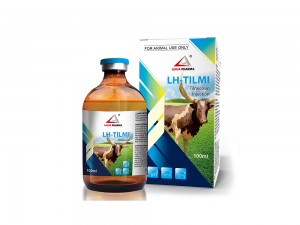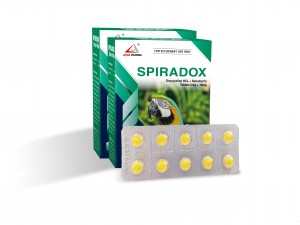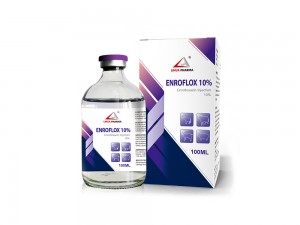Tilmicosin Oral Solution 30%
Tilmicosin is a broad-spectrum semi-synthetic bactericidal macrolide antibiotic synthesized from tylosin. It has an antibacterial spectrum that is predominantly effective against Mycoplasma, Pasteurella and Haemophilus spp. and various Gram-positive organisms such as Corynebacterium spp. It is believed to affect bacterial protein synthesis through binding to 50S ribosomal subunits. Cross-resistance between tilmicosin and other macrolide antibiotics has been observed. Following oral administration, tilmicosin is excreted mainly via the bile into the faeces, with a small proportion being excreted via the urine.
Indications
PIGS:
For the treatment and prevention of respiratory infections associated with Mycoplasma hyopneumoniae, Pasteurella multocida and Actinobacillus pleuropneumoniae.
CHICKENS:
For the treatment and prevention of respiratory infections in poultry flocks associated with Mycoplasma gallisepticum and Mycoplasma synoviae.
TURKEYS:
For the treatment and prevention of respiratory infections in turkey flocks associated with Mycoplasma gallisepticum and Mycoplasma synoviae.
CALVES:
For the treatment and prevention of respiratory infections associated with Mannheimia haemolytica, P. multocida, Mycoplasma bovis and M.dispar susceptible to tilmicosin.
administration and dosage
For oral use only. The product must be diluted in drinking water or milk replace before administration.
Pigs: 15-20 mg tilmicosin per kg body weight for 5 days.
Chickens: 15-20 mg tilmicosin per kg body weight for 3 days.
Turkeys: 10-27 mg tilmicosin per kg body weight for 3 days.
Calves: 12.5 mg tilmicosin per kg body weight two times per day for3-5 days.
Contraindications:
This product can be combined with adrenaline to increase the death of pigs.
It is the same as other macrolides and lincosamides, and should not be used at the same time.
It is antagonistic in combination with β-lactam.
withdrawal period
Meat and offal:
Pigs: 14 days.
Calves: 42 days.
Chickens: 12 days.
Turkeys: 19 days.
Eggs: Not authorised for use in birds producing eggs for human consumption.
Storage
Store below 30℃, protect from light.
For Veterinary UseOnly , Keep out of reach of children
You may also be interested










